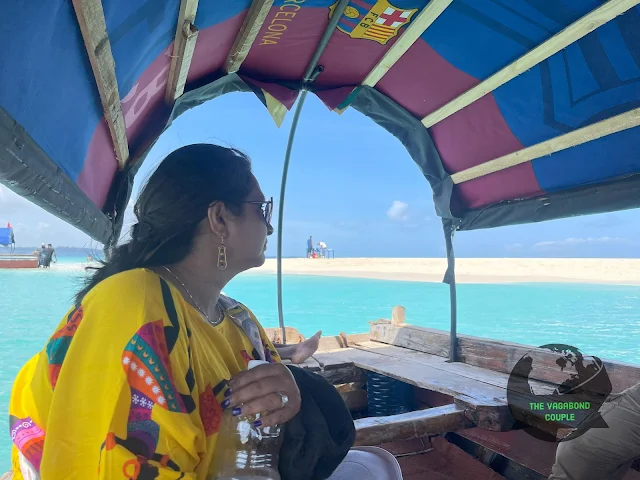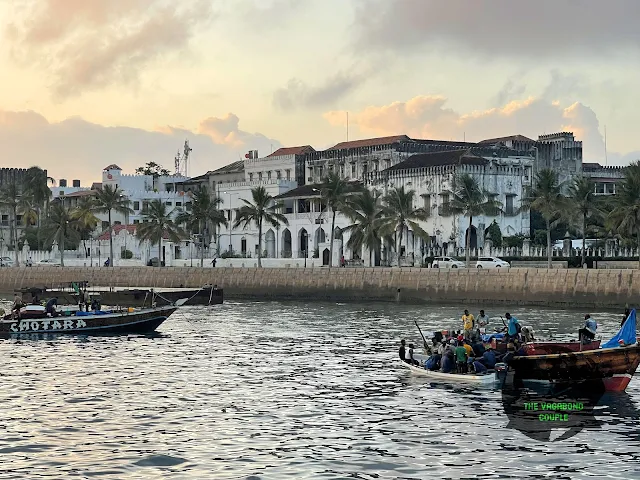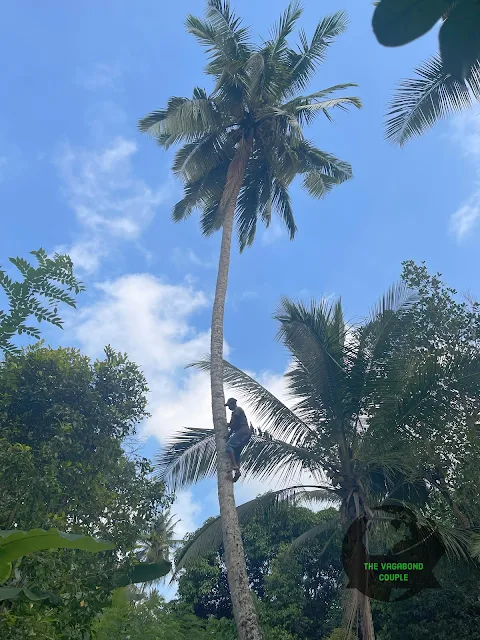Zanzibar - Wonder-Island of Stone, Spices, Turtles, Peacocks and Clear Turquoise Blue-Green Waters
 |
| Sunrise over Stone Town, Zanzibar, Tanzania |
Kilimanjaro to Zanzibar, Dreamer's Island Floating Bungalows, Nakupenda Beach Island, Prison Island and Night Street Food Market
July 9, 2023
A quick hour-long flight takes us from Kilimanjaro International Airport (JRO) to Abeid Amani Karume International Airport, Zanzibar (ZNZ) after an epic trip across Lake Manyara, Serengeti, Ngorongoro and an unforgettable silver jubilee celebration with a Maasai wedding arranged by brothers and sisters at our Maasai village (see An African Safari on the Endless Savanna | Lake Manyara, Serengeti and Ngorongoro in Tanzania and We Marked Our Silver Anniversary with a Maasai Wedding at Our Village Close to the Great Rift Valley in Endless Plains of Serengeti Tanzania).
The airport claims Zanzibar as having the "widest 4G+ network" in huge letters, perhaps a paid advertisement by a mobile service provider.
 |
| Abeid Amani Karume International Airport, Zanzibar (ZNZ) |
The remnants of entry control kiosks from COVID-19 days are still around. We remember our last trip to Zanzibar during pandemic days when we were actually tested for the virus at the airport before being allowed to enter Zanzibar. The notices are still present but completely ignored now.
 |
| COVID-19 era entry control kiosk |
We had prearranged airport pickup with our lodging. A Chinese civil engineering corporation is executing major highway construction along Nyerere Rd from the airport to downtown Stone Town. Such construction is happening across many countries in Africa. As of February of this year, "China has participated in the construction of more than 6,000 kilometers of railways, 6,000 kilometers of roads, nearly 20 ports, and more than 80 large-scale power facilities in Africa. At the end of January this year, the Lekki Deepwater Port in Nigeria, which was built by a Chinese company, held a port opening ceremony. The largest deep-water port in West Africa is expected to create an overall economic benefit of nearly US$360 billion and 170,000 jobs, opening up a new situation for Nigeria's economic development", reports See Tao from Beijing.
 |
| Highway construction on Nyerere Rd, Zanzibar |
We are dropped off at Forodhani Gardens park. From here, we will get by boat to our floating hotel.
Dreamers Island
We have been avoiding big-brand hotel chains and staying in alternative backpackers' lodges. For our stay in historic Stone Town we picked the unusual Dreamers Island Floating Bungalows out in the water.
A short walk across Forodhani Gardens, then along the seawalk and down large ancient slippery stairs to the sand beachhead of the waterfront gets us to our boat pickup point.
 |
| Forodhani Gardens Seawalk: Dreamers Island is behind with the flags |
Dreamers Island is a floating bar and restaurant where they have a few rooms on top and beautifully appointed open lounges with unbeatable views across the water to Zanzibar coastline and Indian ocean.
A small boat arrives from and sails us back to Dreamers Island. The boat service to and from Forodhani Gardens is free for guests staying on the island.
 |
| Boat ride from Forodhani Gardens to Dreamers Island |
There is a bar and restaurant on the main deck of the island where they cook freshly caught seafood and serve hot on order.
 |
| Dreamers Island |
There is a hole with direct access to the water below in the middle of the main reception/bar/restaurant deck. When they need to catch fish to cook seafood, they simply drop little pieces of food into the water as bait. Fish arrive quickly in great numbers which are then scooped up in small fishing nets from above.
 |
| Fishing Hole inside Dreamers Island main deck |
The few rooms on the upper deck are basic and rustic. There are attached bathrooms. Water is supplied from a water tank that is taken ashore every morning on a boat and filled up. Shower and faucet water pressure is low since the tank is barely above in height than the faucets. There is also no water when the tank is away for refilling.
 |
| Rooms for lodging on Dreamers Island upper deck |
There are comfortable lounge chairs and benches with pillows under the shade of straw umbrellas on the upper deck outside the rooms. Our best memories are here, sitting or laying down relaxing with drinks and freshly cooked seafood while looking out at amazing views of the ocean and Stone Town coast. Sunsets and sunrises are spectacular as we will find out later.
 |
| Indian Ocean views from upper deck |
Nakupenda Beach Island: nakupenda pia, we love you too!
 |
| Nakupenda Beach |
After checking in, we head by boat to Nakupenda Island (or Nakupenda Beach). Nakupenda - "I love you" in Swahili - is a narrow sliver of a bright white sandbar in the middle of the ocean.
 |
| Sailing to Nakupenda Island on the "FC Barcelona" |
Nakupenda is so small and shallow that it submerges underwater at high tide. At low tide, the thin dazzling sandbank is surrounded by brilliant turquoise waters which merge into deep ultramarine blue of the Indian Ocean.
 |
| Nakupenda Beach on Indian Ocean at distant horizon |
Tourist motorboats in Zanzibar have all sorts of funky names. Our boat is named "FC Barcelona". Next to another boat named "Whatsapp" there is a small traditional Dhow with sails. Capable of transporting heavy loads across oceans, full-sized Dhow ships with multiple masts and huge sails have been used in trade routes from antiquity particularly across Indian Ocean, Red Sea and Arabian Gulf. They were also the jahazi (Swahili for "ship" from the Arabic "jahaz") of choice for slave traders.
 |
| Dhow at Nakupenda Beach |
As our boat approaches the Nakupenda beachhead, the color combination of white sand beach and turquoise water is striking.
 |
| Nakupenda Island boat landing |
We get off the boat and take a stroll on the tiny sandbar with water on all sides and gentle waves rippling across the sandbar. The entire sandbar will be below water at high tide. We need to be off the island before then.
 |
| Nakupenda Beach |
A mandatory activity on Nakupenda beach is to relax under a canopy having seafood freshly off waterside grills on the island. Fruits and drinks are served along with awesome fresh seafood in super-sized platters to be shared by guests. Everything on these platters is delicious. We especially loved the lobsters.

 |
| Fresh fruits and seafood off the grill under a canopy at Nakupenda Beach |
Another activity popular on Nakupenda beach is to get Mehndi art (also called Henna after the plant used as the source of the dye used for Mehndi) done by artists on the beach. The Mehndi art done here is of Arabic style which is more spaced out and flows on the wrists rather than intricate designs flowing on the palms in Indian and African Mehndi styles.
 |
| Mehndi at Nakupenda Beach |
We get back on our boat and sail towards Prison Island, known as Changuu is Swahili.
On our way, we see another beautiful Dhow.
 |
| Traditional Dhow ship on Indian Ocean between Nakupenda Beach and Prison Island |
Prison Island (Changuu): Peacocks & Giant Tortoises
Remarkably, Prison Island was uninhabited until as late as 1860. It was then briefly used by Arab slave traders to temporarily confine the more mutinous among slaves.
 |
| Changuu (Prison Island), Zanzibar |
The British subsequently built a prison in 1894 which was never used for incarcerating criminals. The facility was actually used to confine Yellow Fever patients away from the main population of Zanzibar, giving it another name of "Quarantine Island". Yet another name of the island that appears in ancient seafarers maps is "Kibandiko Island".
 |
| Nakupenda Island as seen from Prison Island |
As we approach Prison Island, the magical deep ultramarine blue of Indian Ocean merges again into clear turquoise blue-green water. The beachhead of Prison Island is bright white sand that we wade across the water onto.
 |
| Changuu (Prison Island), Zanzibar |
There is a colony of beautiful peacocks on the island.
 |
| Peacock |
In a stroke of luck, we are just in time to watch a male peacock fully fan out his feathers trying his best to impress peahens!
In addition to peacocks, Changuu famously has a captive population of giant Aldabra tortoises. These remarkable 550 lb tortoises are native to Aldabra Atoll, Seychelles, where they are the biggest animals. They live almost 200 years. The ones here are originally from Seychelles sent as gifts to Zanzibar by a British governor.
So far, the largest of these great land tortoises has been recorded at a whopping 672 lbs.
 |
| Aldabra giant tortoise |
Aldabra tortoises have 3-foot long super long necks to get to food while foraging in the wild. But out here at Prison Island, they spend zero effort in finding food thanks to tourists keeping them very well-fed indeed.
The calm and gentle Aldabra giant tortoises make great pets and learn quickly to identify their human caretakers.
 |
| Aldabra giant tortoises |
Today Prison Island is a tourist destination under the care of the semi-autonomous Revolutionary Government of Zanzibar. Visitors can walk around the structure including the courtyard and various rooms and cells around it. There are pictures of some Brits hanging on the walls. Stairs from a metal gate lead to a ledge outside with a nice view of the ocean.

 |
| The Prison Building of Prison Island |
We head back to Dreamers Island to relax for a little bit till sunset.
 |
| Dreamers Island |
Zanzibar Sunset
The sun sets over the Indian Ocean to the west of Zanzibar island.
 |
| Zanzibar sunset |
Zanzibar Fashion Week
As the sun sets we take a boat back to Forodhani Gardens to check out the world-famous open-air night barbecue and street food market. Coincidentally tonight is the first night of the Zanzibar Fashion Week also happening at the Old Fort with live performances and entertainment on a huge stage we can see from our table at Zenji Garden Cafe.

 | |
|
Forodhani Gardens Zanzibar Night Street Food
Watch: World Famous Night Street Food at Forodhani Gardens, Stone Town, Zanzibar
We head to to the night street food market after a quick cup of cappuccino from Zenji Garden Cafe.
 |
| Night street food and barbeque market seen behind Zenji Garden Cafe |
Each evening after sunset, this part of Forodhani Gardens park transforms into a delightfully crowded sea of humanity, street food and barbeque market. Chefs sell food on long tables under traditional Hazak lamps (petromax lamps).
There is, of course, food being cooked here and fresh sugarcanes being hand-pressed.
 |
| Sugarcanes being hand pressed for juice |
A bewildering variety of food is being sold at the numerous tables. We have, however, been warned by multiple locals to be weary of stale food sometimes days or weeks old, and insist on fresh cooked items.
We follow the advice and have the unique Zanzibar street food specialty urojo, platters of awesome fish and lamb kabobs with potatoes and veggies, great meat-filled samosas with chutney and delicious sugarcane juice with ginger and lime. There is a remarkable degree of Indian influence with bhel poori, dahi poori, sev poori, pani poori and variants being on sale as well!
 |
| Delicious street food |
The food is excellent. Despite some noise on the internet, we would have no issues at all with our stomachs later on. We even take a picture with the chef whose table we picked most of our food from.
 |
| Our chef |
Contended and quite full at the end of a long day that started in Arusha, we head back to Dreamers Island to get some sleep.
 |
| Dreamers Island |
Zanzibar Sunrise, Stone Town, Freddie Mercury and a Spice Farm
July 10, 2023
Zanzibar Sunrise
Overnighting on a floating island has the advantage of watching the sun rise over Stone Town from across the water. At 5:56 AM, a red hue of dawn lights the sky up over Zanzibar Harbor and Port of Zanzibar to our north-east.
 |
| Zanzibar Harbor and port at sunrise |
By 6:42 AM there is magic to the east where the sun rising behind the spectacular architecture of white Arab mansions on coastal Mizingani Rd in Stone Town is a sight to behold.

 |
| Sunrise over Stone Town |
The tourist boats lie in wait but the fishermen in their fishing boats start to come back with enough seafood for another day in Zanzibar for residents and visitors.
 |
| Local fishermen in fishing boats at sunrise |
After an excellent breakfast on board, we check out of Dreamers Island and sail back to Forodhani Gardens Park.
Stone Town, Zanzibar: A Delightful Historical and Architectural Confluence
Stone Town of Zanzibar is a UNESCO World Heritage site for Outstanding Universal Value. The name comes from the primary material used for construction: natural white coral limestone quarried from deposits left by ancient coral colonies. Such coral limestone constructions are frequently seen across countries surrounding the Indian Ocean, Red Sea and Persian Gulf.
Stone Town is an "outstanding example of a Swahili trading town. This type of town developed on the coast of East Africa, further expanded under Arab, Indian, and European influences, but retained its indigenous elements, to form an urban cultural unit unique to this region. The Stone Town of Zanzibar retains its urban fabric and townscape virtually intact and contains many fine buildings that reflect its particular culture, which has brought together and homogenized disparate elements of the cultures of Africa, the Arab region, India, and Europe over more than a millennium. The buildings of the Stone Town, executed principally in coralline ragstone and mangrove timber, set in a thick lime mortar and then plastered and lime-washed, reflect a complex fusion of Swahili, Indian, Arab and European influences in building traditions and town planning. The two storey houses with long narrow rooms disposed round an open courtyard, reached through a narrow corridor, are distinguished externally by elaborately carved double ‘Zanzibar’ doors, and some by wide vernadahs, and by richly decorated interiors. Together with, the simple ground floor Swahili houses and the narrow façade Indian shops along “bazaar” streets constructed around a commercial space “duka”," says UNESCO.
Houses built by Indians have open balconies with intricate wood and metal work and large windows with colorful stained glass. Arab houses have high flat white walls and small windows with grills on them.
 |
| Narrow winding alleys of historic Stone Town, Zanzibar |
Freddie Mercury: The Legend, not just a Star
This house on Kenyatta Road in Stone Town is a pilgrimage site for Queen fans of the world. Freddie Mercury was born and grew up here till age 18, although he spent most of that time studying in boarding schools in India.
 |
| Freddie Mercury's house |
Freddie was born Farrokh Bulsara on September 5, 1946 to Bomi and Jer Bulsara just over half a mile away at Zanzibar Government Hospital. His sister Karishma Bulsara was born six years later. His father Bomi was employed as a cashier at Zanzibar's British Government Office.

The Bulsara family were originally Parsees from the state of Gujarat in India. Zoroastrians by faith, the Parsee community of India trace their origins to Persia which their ancestors fled to escape Muslim persecution over 1,200 years ago.

The minority Arab rulers and affluent Indian elite of Zanzibar found themselves in trouble in 1963 with the onset of the Zanzibar Revolution. Thousands of Arabs and Indians died and numerous more were expelled in the turbulent period. Freddie and his family escaped to England in 1963.
Freddie Mercury co-founded Queen in 1970. His legendary lyrics, music and four-octave voice will, of course, live on forever.
Kidichi Spice Farm on the Spice Island
Portuguese traders introduced spice plants from India and South America into Zanzibar in the 16th century. Zanzibar spices quickly caught on and have been a greatly profitable trade, giving Zanzibar another nickname of "Spice Island". Today tourists can get on educational tours of places like Kidichi Spice Farm where they can smell and taste numerous spices directly from plants while learning about them. It is only half an hour away north of Zanzibar City.
The 2-hour tour takes us across the farm with stops at around 25 different kinds of spice plants, climbers, creepers and trees.
It is interesting to get up close and physical with spices. We rub some leaves on our hands, feel and play with spices with our palms and fingers, and eat them. We were soon smelling strongly of a combination of spices ourselves.
Towards the end of the tour, a farmhand climbs all the way up a coconut tree and drops fresh water-filled coconuts down for us.
At the end of the tour, we are served snacks and coconut water, and presented with hats and necklaces made of palm leaves.
This concludes the Zanzibar leg of our trip. We head to the airport and fly out to Doha and commence on an epic trip across Morocco from there. Check out the first episode of our story in Morocco at "Marrakech: Daughter of the Desert and Atlas Mountains | Medina, Jemaa el-Fna Square, Atlas Mountains, Ourika, Berber Village to Sti Fadma Falls | ⵎⵕⵕⴰⴽⵛ, ⵜⴰⴳⵍⴷⵉⵜ ⵏ ⵍⵎⵖⵔⵉⴱ".

















































0 comments